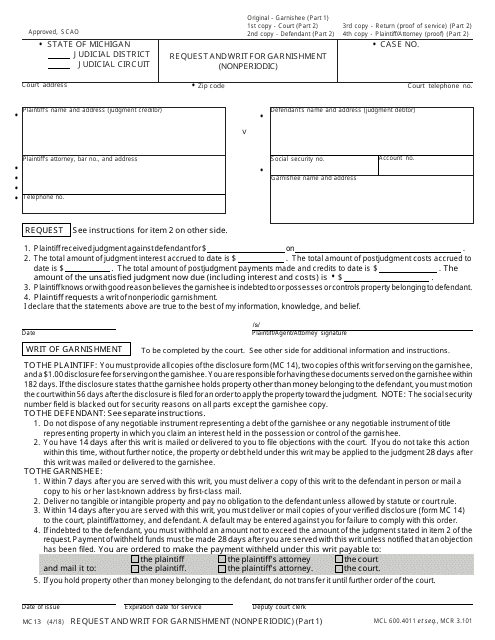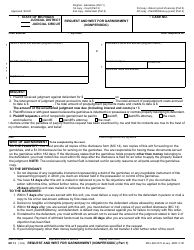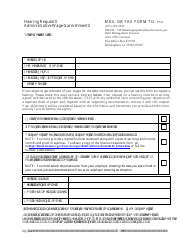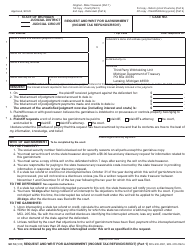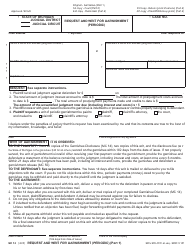This version of the form is not currently in use and is provided for reference only. Download this version of
Form MC13
for the current year.
Form MC13 Request and Writ for Garnishment (Nonperiodic) - Michigan
What Is Form MC13?
This is a legal form that was released by the Michigan Courts - a government authority operating within Michigan. As of today, no separate filing guidelines for the form are provided by the issuing department.
FAQ
Q: What is an MC13 form?
A: The MC13 form is a Request and Writ for Garnishment (Nonperiodic) in Michigan.
Q: What is garnishment?
A: Garnishment is a legal process by which a creditor can collect money owed by a debtor from a third party who owes money to the debtor, such as an employer.
Q: When is an MC13 form used?
A: The MC13 form is used in Michigan when a creditor wants to collect money that is owed to them by garnishing the debtor's wages or other income.
Q: What information is required on the MC13 form?
A: The MC13 form requires information about the creditor, the debtor, and the third party (such as the employer) who owes money to the debtor.
Q: How do I fill out the MC13 form?
A: You should fill out the MC13 form carefully and accurately, following the instructions provided. It is recommended to seek legal advice if you are unsure how to fill out the form.
Q: Is there a fee to file the MC13 form?
A: Yes, there is usually a filing fee associated with submitting the MC13 form. The fee amount may vary, so it is best to check with the court or judicial system in Michigan.
Q: What happens after the MC13 form is filed?
A: Once the MC13 form is filed, the court will review it and if approved, issue a writ of garnishment. The third party (such as the employer) will then be notified to withhold the specified amount from the debtor's wages or income and send it to the creditor.
Q: What should I do if I receive an MC13 form?
A: If you receive an MC13 form, it is important to carefully review it and consult with legal counsel if needed. You may have rights and options to challenge the garnishment.
Q: Can I stop a garnishment once it is in effect?
A: There may be ways to stop a garnishment once it is in effect, such as negotiating a payment arrangement with the creditor or filing for bankruptcy. It is advised to seek legal advice for guidance on your specific situation.
Form Details:
- Released on April 1, 2018;
- The latest edition provided by the Michigan Courts;
- Easy to use and ready to print;
- Quick to customize;
- Compatible with most PDF-viewing applications;
- Fill out the form in our online filing application.
Download a fillable version of Form MC13 by clicking the link below or browse more documents and templates provided by the Michigan Courts.
